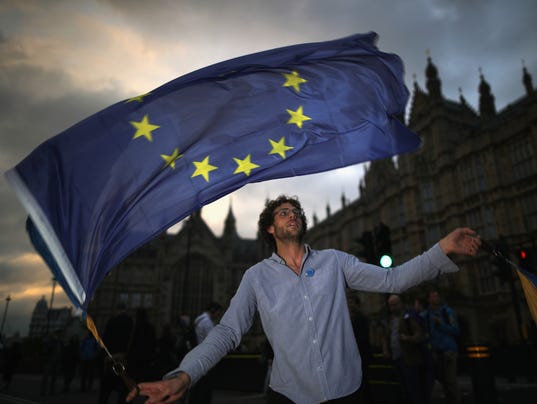Backwards Brexit doomsayers: Column
The alarmists have everything exactly backward.
Brexit has brought forth a legion of Chicken Littles. They have predicted doom for the United Kingdom, stripped of its free access to the European Union ’s common market, diminished in its own realm byScottish independence and, then, the departure ofNorthern Ireland.
The sky is not going to fall.
The U.K. is a net importer from the EU, so any tariff war or trade restrictions will hurt EU businesses more than U.K. companies, especially exporters in Germany, which is a huge trading nation. As for Scotland, it can’t afford its independence.
Nevertheless, over the weekend, Nicola Sturgeon,
the leader of the Scottish National Party (SNP) and Scotland’s
semiautonomous government, announced that a second independence
referendum was “on the table” — second, because Scotland just held a
referendum in 2014, when 55% of Scots voted
to remain in the U.K. Scots are understandably bitter today because
most voted to stay in order to retain membership in the EU via their
membership in the U.K.
However
bitter and rebellious the Scots may be now, nationalist aspirations do
not translate automatically into readiness for independence. Scottish
independence has always been predicated upon North Sea oil revenue.
Unfortunately, the long-term decline in North Sea production has continued and oil prices have collapsed. In terms of the SNP’s historical rallying cry, “it’s Scotland’s oil,” but it won’t pay for independence.
Indeed,
this year saw the release of several studies of what might have been.
On March 24, which would have been the first day of independence had
there been a yes vote in 2014, London’s Telegraph published
a review of the various studies under the headline “Independent
Scotland ‘would have started life today £2,000 per person worse off’.”
Analysis by the Institute for Fiscal Studies pegged
an independent Scotland’s budget deficit at 9.4% of its gross domestic
product, considerably worse than the minimal requirement for EU entry (a
deficit no worse than 3% of GDP).
Sturgeon was not alone with unconsidered immediate reaction to the Brexit vote. A passel of EU mandarins announced that the U.K. would have to withdraw from the EU forthwith, so jilted did they feel. But German Chancellor Angela Merkel overruled
them, saying the U.K. could take its time. No doubt, Merkel had done a
quick calculation of national interest, taking into account Germany’s 50
billion euro in annual net exports to the U.K (trade of 90 billion
euros in German goods vs. only about 40 billion euros for the U.K.),
according to Germany’s Destatis statistics
office. She must have realized that she couldn’t let those EU
commissioners run amok, chasing the U.K. out and imposing punitive
tariffs. A 10% EU tariff on U.K. goods, for example, would be met by a
retaliatory 10% tariff on EU goods entering the U.K. That would cost
Germany about 5 billion euros a year.
The
alarmists have everything exactly backward. It is the EU that is under
threat of dissolution, and it is the EU’s strongest member, Germany,
that would be most vulnerable were trade relations to deteriorate. There
are increasingly strong opposition political parties in most EU
countries, which are anti-EU, anti-euro and anti-immigration, such as
the National Front in France and the Freedom Party in the Netherlands. According to Goldman Sachs, in
opinion polls in May, the National Front drew 27% public support and
Freedom 35%. These are significant levels within the context of the
typical multiparty system in most European countries.
POLICING THE USA: A look at race, justice, media
On
the trade front, the alarmists have missed another German and EU
vulnerability: currency exchange rates. Instead of manifesting disaster,
the precipitous decline of the pound sterling,
if prolonged, would provide the U.K. a tremendous trade boost — and a
substantial headwind for German and other EU members’ exports to the
U.K. So Merkel is not going to support punitive measures that would
seriously and permanently damage a key trading partner, weakening its
currency in the long term. And that reality extends to the EU’s
treatment of London. The financial center in that city constitutes a disproportionately large proportion of U.K. GDP, and the EU has its own self-interest in its remaining that way.
The
EU needs the U.K. as much or more than the U.K. needs the EU. This
reality will bring cooperation rather than the opposite. Again, the sky
over the U.K. is not going to fall.
Red Jahncke is president of The Townsend Group International, a business consulting firm.
In addition to its own editorials, USA TODAY publishes diverse opinions from outside writers, including our Board of Contributors. To read more columns, go to the Opinion front page and follow us on Twitter @USATOpinion.



No comments:
Post a Comment